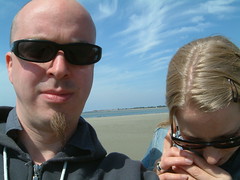 The gospel for the Fifteenth Sunday after Trinity yesterday was Luke 15: 1-10, the parables of the lost sheep and the lost coin.
The gospel for the Fifteenth Sunday after Trinity yesterday was Luke 15: 1-10, the parables of the lost sheep and the lost coin.We had a very interesting discussion time at our eucharist on the text. what does it mean to be lost and what does it mean to be found?
There is a very kind of "right-on" perspective which really struggles to imagine anyone as being 'lost'. Who are we to judge people or say that we are 'the found' and that they are 'the lost'. How arrogant and condescending!
At one point in our discussion someone looked out of the window at the street and asked whether we really had to believe that all the people walking past were really and truly lost.
But I think it's vital to hold on to this sense of 'lostness' if we are really going to 'honour' people's pain and take it seriously. The fact of the matter is that as much as we want to say that people are alright as they are (the trendy, right-on view)I suspect a lot of people would not say that about themselves. We want to say they are alright as they are but they know they're not. They know and experience pain and alienation in many different ways and this is a big part of what I would call 'lostness'. They may not use this language but there is a very real sense in which they need to be 'found', and they know it. Our political correctness does not help anyone. And we ourselves, even as followers of Christ, need to go on being found by him - there are parts of us that are still in the 'lostness' of pain and alienation.
Now that 'being found' may not mean 'coming to our church' and believing all the same things we do (and one of the reasons we squirm a bit when talking about these things is that we inherit these concepts with these 'colonial' overtones ringing in our ears) - but if we abandon the possibility that people are lost and need to be found then we not only diminish the gospel we also trivialize people's very real sense of their own pain.
The fact is that, as someone else in the discussion beautifully pointed out, these parables tell us that there is no where that God cannot find us. But God doesn't just locate us, he picks us up and carries us away from our alienation and pain and returns us to our homeland in him.




